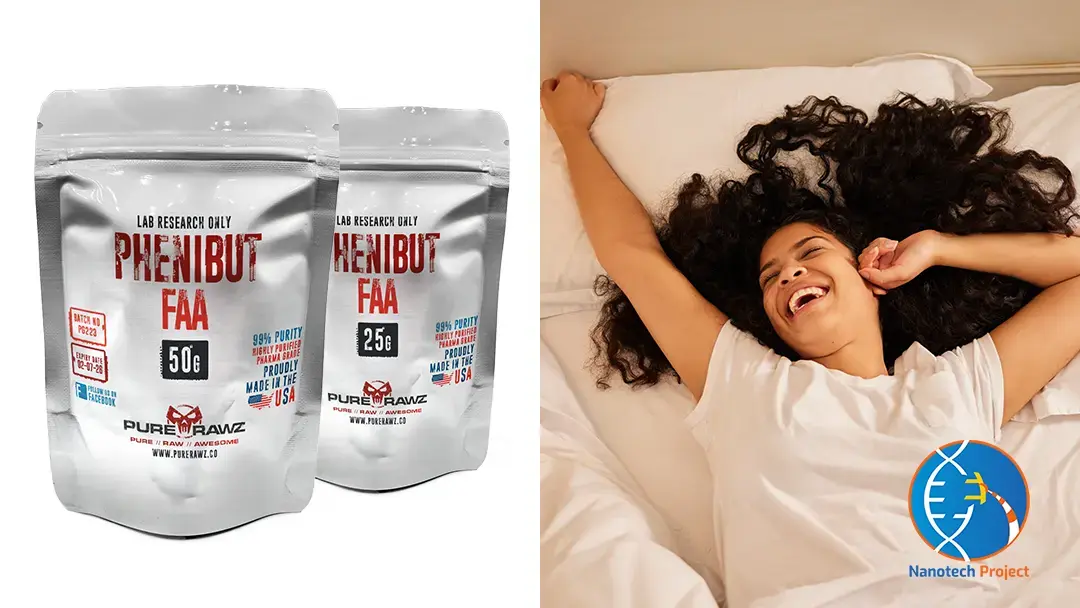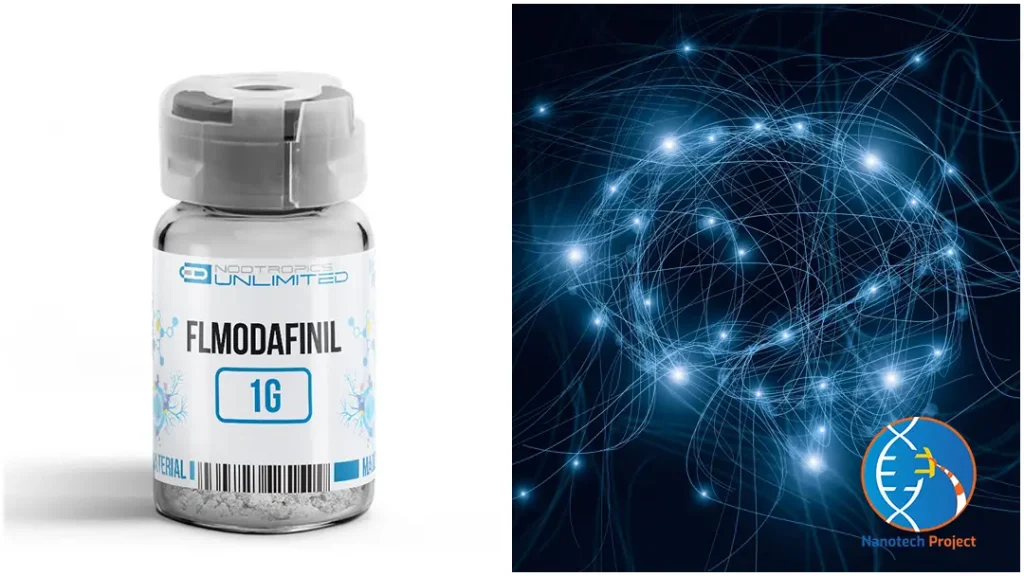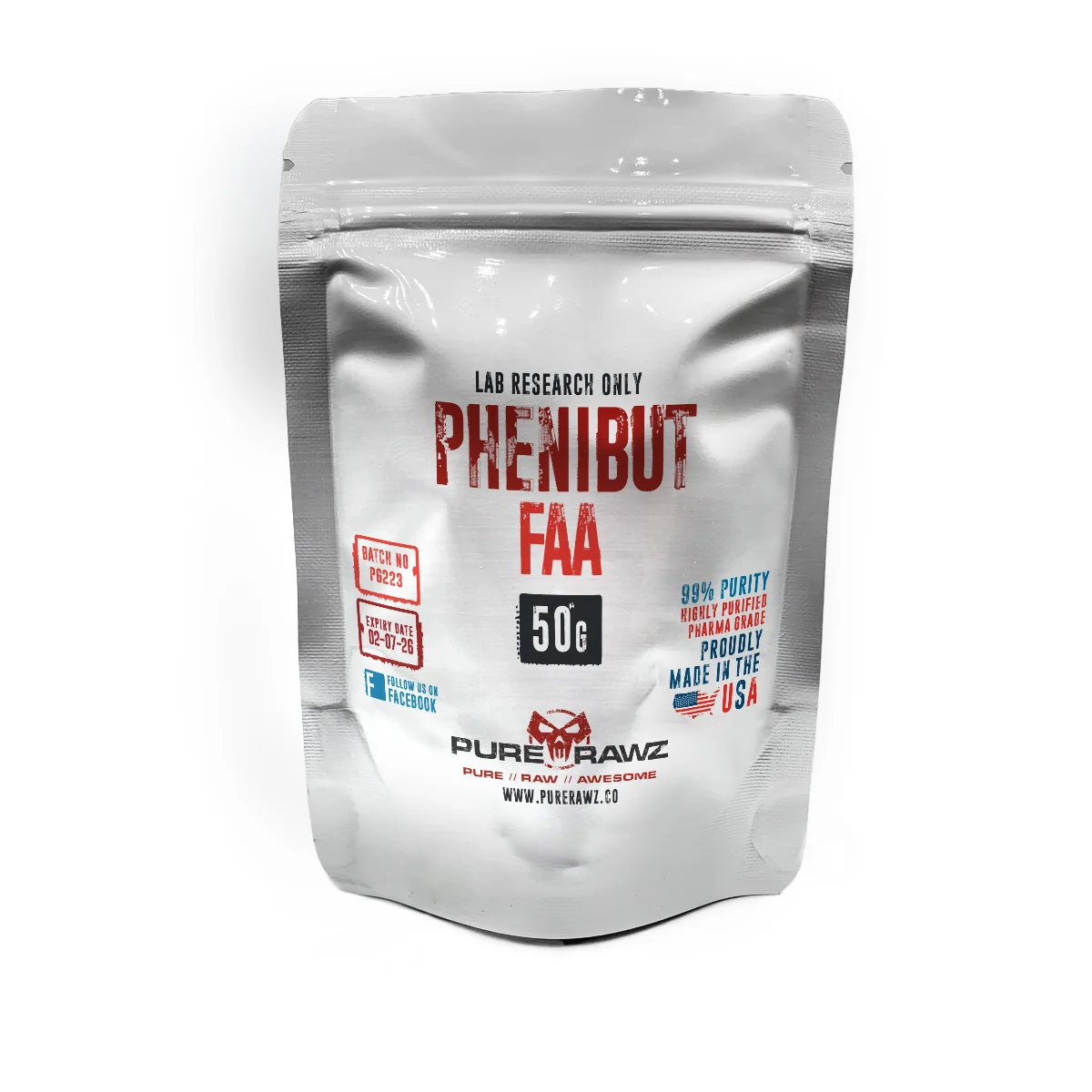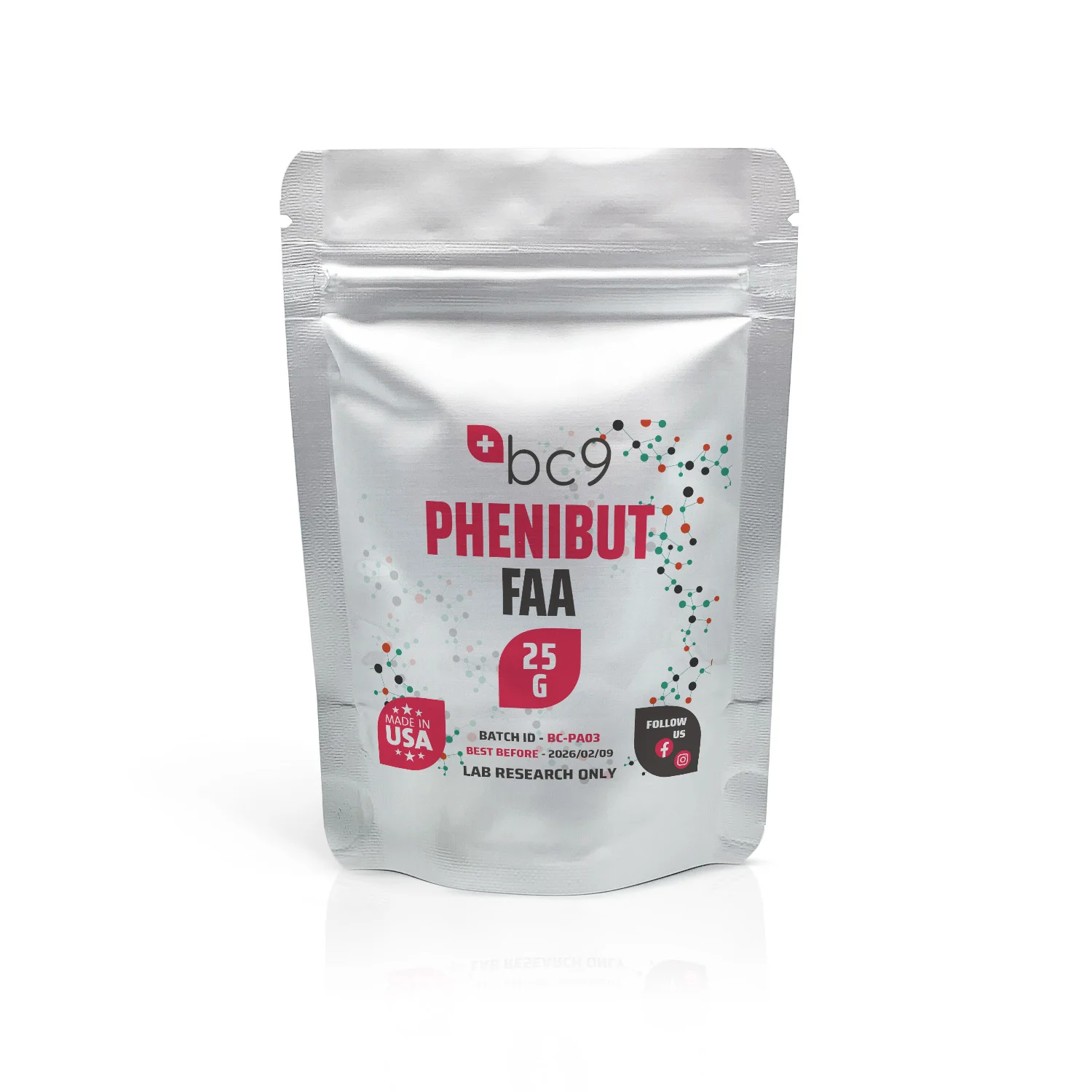Strap in and get ready to explore the latest buzz in the nootropic world – Phenibut FAA’s 2024 revival. This potent GABA-mimicking compound has been turning heads and raising eyebrows with its purported anxiolytic, cognitive-enhancing, and sleep-promoting properties.
But is it really the holy grail of brain boosters, or just another over-hyped supplement? In this no-nonsense review, we dive deep into Phenibut FAA’s mechanisms, potential benefits, dosages, and safety concerns.
Brace yourself for a wild ride as we separate fact from fiction and uncover whether this controversial nootropic deserves a spot in your daily regimen or should be left on the shelf. Get ready to have your mind blown (or maybe just gently nudged) as we unlock the mysteries of 2024’s hottest smart drug.

Product Information
| Phenibut FAA | |
| CAS Number | 1078-21-3 |
| Molar Mass | 179.22 g·mol−1 |
| Chemical Formula | C10H13NO2 |
| IUPAC Name | 4-amino-3-phenylbutanoic acid |
What is Phenibut FAA?
Phenibut FAA (β-Phenyl-γ-aminobutyric acid) made its debut in the Soviet Union during the 1960s, marking the beginning of a fascinating journey into the realm of nootropics. This compound, belonging to the gabapentinoid class, functions as a receptor for GABA, positioning itself as an anxiolytic GABA derivative.
Phenibut FAA is characterized by its dual nature, acting as both a depressant and stimulant for the central nervous system. Recent scientific research has unveiled its structural similarity to y-aminobutyric acid (GABA), a neurotransmitter in the human brain. This structural resemblance leads to mild dopamine increases, offering a unique combination of tranquility and cognitive enhancement.
As an experimental nutritional supplement and nootropic, Phenibut FAA holds promise in various areas. Its potential to serve as a tranquilizer and nootropic drug positions it as a candidate for motivation and mood elevation. The anti-anxiety relief it provides adds another layer to its multifaceted profile, making it an intriguing substance for those seeking cognitive enhancement and mental well-being.
In essence, Phenibut FAA invites users to explore the synergy of science and cognitive enhancement. By delving into the tranquilizing effects and mood-elevating properties, individuals may discover a valuable ally in their pursuit of a more serene and focused mental state. Phenibut FAA isn’t just a supplement; it’s a catalyst for unlocking the potential for tranquility and cognitive excellence.
Types of Phenibut: Phenibut HCL versus FAA Phenibut
Phenibut has two major forms: the free amino acid and the hydrochloride salt. Each type brings its own nuances to the table, impacting factors like absorption, bioavailability, and dosage. So, here’s the lowdown:
Phenibut Free Amino Acid:
Picture this as the pure, unbound essence of Phenibut. It’s the basic structure without any extra salts tagging along. This free amino acid form often takes the spotlight in nootropic and supplement formulations. If you’re all about the unadulterated Phenibut experience, this might just be your go-to.
Phenibut Hydrochloride (HCl):
Now, let’s talk about the hydrochloride salt form. Phenibut Hydrochloride is the saltier sibling, where the free amino acid cozies up with hydrochloric acid. This marriage of components makes the HCl form more stable and soluble than its free amino acid counterpart. It’s no surprise that Phenibut HCl takes the lead in the supplement world, being the more common and widely available version on the market.
While both these forms have their roles, Phenibut Hydrochloride often steals the spotlight. It’s the one you’ll likely encounter more frequently in commercial products and research ventures. Why? Well, its stability and solubility make it a favorite in various formulations.
Is Phenibut FAA Legal?
Phenibut FAA’s legal status varies depending on where you are. In Russia, Ukraine, Belarus, and Latvia, it’s a licensed medication. However, most countries don’t approve it for medical use. In these places, it’s often sold online as a supplement, bypassing the need for a prescription. The United States falls into this category, where Phenibut FAA isn’t regulated as a drug but selling it as a supplement is illegal. To be certain about the legality of Phenibut FAA in your area, it’s crucial to consult the specific regulations of your country or region.
How Does Phenibut FAA Work?

Phenibut FAA (Free Amino Acid) is a variation of phenibut that has the phenibut molecule attached to a free amino acid structure. The mechanism of action of Phenibut FAA is primarily attributed to its interaction with the Gamma Aminobutyric Acid (GABA) receptors and its ability to block voltage-dependent Ca2+ channels.
Phenibut FAA helps your brain stay calm and relaxed. Your brain has a system called GABA that acts like a brake pedal, balancing out the excitatory neurotransmitters that get you excited or anxious.
However, GABA itself can’t enter the brain directly. It’s like it’s not allowed into the brain party. This is where Phenibut FAA comes in – it helps GABA get into the brain.
Phenibut FAA modifies the GABA molecule slightly by adding a phenyl ring, which allows it to cross the blood-brain barrier easily. Once inside the brain, it binds to GABA receptors, particularly GABA-B receptors at lower doses and GABA-A receptors at higher doses.
These GABA receptors act like relaxation zones in the brain. When things get too hectic or stressful, they get activated by GABA (with Phenibut FAA’s help) and calm things down, blocking signals associated with anxiety and stress.
So while regular GABA supplements may not work well because GABA can’t enter the brain, Phenibut FAA acts like a VIP pass, allowing GABA to do its job of reducing stress and promoting calmness in the brain.
However, it’s important to use Phenibut FAA in moderation, as excessive use can potentially lead to side effects. But in proper doses, it can help maintain a relaxed, non-anxious state of mind.
You might be interested in our other articles.
Phenibut FAA and Brain Waves
Increasing GABA activity in the brain through supplements like Phenibut FAA can change your brain wave patterns. Brain waves are the electrical signals produced by your brain in different mental states.
There are two key types of brain waves affected by GABA – alpha and beta waves.
Beta brain waves are the fastest waves your brain produces. They are associated with focused concentration and engaged, deliberate action. While beta waves are important for staying on task, too many of them can actually lead to overstimulation, stress, and anxiety.
On the other hand, alpha brain waves are slower and have a higher amplitude. They indicate a more relaxed, calm state of mind. This is the brain wave pattern you experience during activities like meditation or going for a relaxing walk. Alpha waves help you get “in the zone” and achieve a state of flow.
According to research, taking GABA supplements like Phenibut FAA increases alpha brain wave activity while simultaneously reducing beta brain waves. This shift demonstrates GABA’s acute anti-stress and anti-anxiety effects.
By boosting calming alpha waves and reducing stimulating beta waves, Phenibut FAA helps keep you relaxed and focused without overstimulation or excessive stress and anxiety. It promotes a balanced state of calm alertness ideal for concentration and productivity.
Phenibut FAA Benefits
Now let’s get into the reasons why Phenibut FAA has become phenomenal among nootropic researchers and users alike:
- Phenibut FAA may enhance cognitive function.
There was this really interesting study done on rabbits looking at Phenibut FAA and its effects on brain activity. What they found was pretty wild! Basically, Phenibut seemed to improve how the neurons in the rabbits’ brain cortex responded to different stimuli. It was like it helped balance out the inhibitory and excitatory signals better, regardless of what was triggering them.
Now here’s where it gets really intriguing for us humans. The researchers think that based on these results, low doses of Phenibut could potentially boost cognitive performance, especially in high-pressure situations where you really need to stay focused and on your game mentally.
The study was small-scale for sure, but it showed measurable improvements in test scores related to brain function when the rabbits were given Phenibut. So there’s a possibility it could help humans power through demanding cognitive tasks too.
But before we all run out to stock up on Phenibut for a brain boost, we need to pump the brakes a little. This study just gives us a sneak peek – we’re going to need way more clinical trials and research in humans to really understand if and how Phenibut could safely enhance cognition for people.

While the potential is exciting based on these rabbit results, using Phenibut as a study drug or cognitive enhancer is still premature at this point. We’ve got to let the scientists do their thing and scrutinize this stuff thoroughly first before making any claims.
- Phenibut FAA may promote good sleep.
Research indicates that Phenibut FAA may have beneficial effects when it comes to promoting better sleep. In one study involving 62 patients, researchers found that Phenibut significantly reduced the symptoms of various sleep disorders among the subjects. This points towards Phenibut’s potential as a sleep aid and its ability to improve overall sleep quality.
Further supporting this application, another study suggests that Phenibut FAA could help individuals experiencing alcohol withdrawal syndrome to achieve more restful sleep. This particular benefit may be especially valuable, as disturbed sleep patterns are a common issue faced during alcohol withdrawal.
While the exact mechanisms are still being investigated, it’s theorized that Phenibut’s interaction with GABA receptors in the brain may play a role in its sleep-promoting effects. By modulating GABA activity, Phenibut could help induce a calmer, more relaxed state conducive to falling and staying asleep.
Now, it’s important to keep in mind that more large-scale clinical research is still needed to fully validate these findings and determine appropriate dosages. But the available evidence does highlight Phenibut FAA’s promise as a potential intervention for various sleep-related issues.

- Phenibut FAA may increase human growth hormone.
Another interesting laboratory study explored the effects of Phenibut FAA on growth hormone levels in the body. In this study, 19 subjects received an oral dose of 5 grams of Phenibut FAA, while 18 others were given a placebo. Three hours after administration, blood samples were collected from all participants.
The researchers made an intriguing discovery – those who took Phenibut FAA exhibited significantly elevated levels of growth hormone in their blood plasma compared to the placebo group. This effect is theorized to be due to Phenibut’s ability to mimic the activity of GABA in the brain and body.
Now, this finding is certainly promising from a scientific perspective. Growth hormone is an important metabolic substance with various potential benefits, such as supporting muscle growth, bone density, and overall physical recovery. If Phenibut FAA can reliably boost growth hormone levels, it could potentially have applications in areas like athletic performance, injury rehabilitation, or even anti-aging therapies.
However, before we get too excited, it’s crucial to understand that this was just a single laboratory study with a relatively small sample size. While the results are encouraging, more extensive research is still required to validate and expand upon these initial findings.
Larger clinical trials would be needed to confirm Phenibut FAA’s growth hormone-enhancing effects in diverse populations, determine optimal dosages, and thoroughly assess any potential risks or side effects associated with its use for this purpose.
- Phenibut FAA may relieve anxiety.
In Russia, Phenibut has allegedly been used for a variety of therapeutic applications related to mental health and well-being. According to reports, it has shown promise in relieving symptoms such as tension, anxiety, fear, and sleep disturbances in patients suffering from psychosomatic or neurotic disorders.
Additionally, Phenibut has been employed as a supportive medication in pre- and post-operative settings, potentially helping patients manage stress and discomfort associated with surgical procedures.
Beyond anxiety and sleep issues, there are also claims that Phenibut may be beneficial for conditions like asthenia (physical and mental fatigue), depression, and post-traumatic stress disorder (PTSD). Its purported anxiolytic and mood-enhancing effects could make it a valuable intervention for these often debilitating conditions.
Other Nootropics as Alternative for Phenibut HCl
Phenibut HCL Powder
Phenibut HCl, short for Phenibut Hydrochloride, is a medication designed in Russia as a potential alternative to addictive substances like alcohol. It works by mimicking GABA, a brain chemical that promotes relaxation and sleep. While marketed online and in stores as a supplement for anxiety, sleep, and even curbing withdrawal symptoms from other drugs, Phenibut HCl isn’t approved by the FDA. A significant drawback is the risk of dependence. Stopping Phenibut HCl abruptly can trigger withdrawal symptoms similar to the very anxieties it aims to reduce. If considering Phenibut HCl, it’s crucial to weigh the risks and benefits, start with minimal doses, and avoid daily use to minimize the chance of addiction.
Noopept
Noopept, a synthetic nootropic, is under investigation for its potential benefits in cognitive health. Clinical studies suggest it might be helpful for people with mild cognitive disorders by reducing anxiety, irritability, and sleep problems, potentially leading to improved emotional well-being. Interestingly, human research also points towards Noopept’s ability to shorten recovery time after brain injuries. While preclinical studies in animals show promise for enhancing memory formation and retrieval, more research is needed to confirm these findings in humans. It’s important to remember that Noopept is still a research chemical, and its long-term safety and efficacy are not yet fully understood.
Piracetam
Piracetam is a medication with properties that could benefit the brain in multiple ways. Studies suggest it might act as a neuroprotectant, shielding brain cells from damage, and even have anti-seizure effects. Piracetam shows promise in improving verbal learning and memory, especially for those with dyslexia or dementia. Furthermore, it might enhance cognitive function, memory, and focus in people with circulation problems affecting the brain. There’s even some research indicating it could help reduce breath-holding spells in children. However, it’s important to note that more research is needed to confirm these potential benefits.
Pramiracetam
Pramiracetam is a nootropic drug currently in the experimental stage. Belonging to the “racetam” family alongside Piracetam, it holds promise for cognitive enhancement. While the exact way it affects the brain and specific cognitive functions remains under investigation, Pramiracetam has been studied for its potential use in treating Alzheimer’s disease and aiding memory and cognitive issues following electroconvulsive therapy for severe depression. However, it’s important to remember that Pramiracetam is not yet a licensed medication and is still considered a research chemical. This means its safety and effectiveness for long-term use haven’t been fully established.
Oxiracetam
Oxiracetam, a racetam nootropic like Piracetam, stands out for its potential to improve memory and cognitive function. Studies suggest it can cross the blood-brain barrier, possibly aiding in conditions like neurodegenerative diseases, memory deficits, strokes, seizures, and even anxiety. Interestingly, compared to Piracetam, Oxiracetam appears to be more effective in tackling cognitive impairment and boosting memory. Clinical trials also show it has good absorption by the body (bioavailability) and lasts for a moderate amount of time (3-6 hour half-life).
Phenibut FAA Side Effects

When discussing the safety profile of Phenibut FAA, it’s important to approach it with caution and objectivity. While Phenibut may offer potential benefits, it’s crucial to understand and acknowledge the risks associated with its use.
Unlike some other nootropic compounds, Phenibut does have a real side-effect profile that should not be overlooked. Overdosing on Phenibut can lead to a range of unpleasant and concerning symptoms, including impaired motor control, loss of coordination, drowsiness, nausea, excessive sleeping, headaches, lack of social inhibition, and even numbness. These effects bear a resemblance to the symptoms of alcohol intoxication, which is not surprising, given that both substances act on the GABA pathway in the brain.
While a Phenibut overdose may not be physically dangerous in the same way as an alcohol overdose, it can still make the user feel extremely unwell. It’s essential to be aware that it is possible to overdose on Phenibut if taken in excessive amounts or with too high a frequency.
One of the most significant risks associated with Phenibut is the potential for developing dependence and experiencing severe withdrawal symptoms. Users who have taken Phenibut daily for extended periods, such as weeks or months, have reported truly harrowing withdrawal experiences.
These can include dysphoria, panic attacks, insomnia, and intense cravings that can last for weeks before the body recovers from Phenibut abuse. Some have even described the withdrawal process as being similar in intensity to that of opiates or benzodiazepines.
It cannot be overstated how crucial it is to use Phenibut responsibly and strictly adhere to its intended use as an occasional, short-term supplement, rather than a daily anti-anxiety medication. Ignoring this warning and abusing Phenibut can lead to a truly terrible situation, with the user finding themselves trapped in a cycle of dependence and withdrawal.
Phenibut FAA Dosage
For beginners seeking a relaxation or calming effect, the recommended starting daily dose is 200-300mg. It’s important to note that Phenibut can take 2-4 hours to fully kick in, so patience is required after administration. Additionally, Phenibut should be taken on an empty stomach for optimal absorption.
More experienced users may opt for higher doses, typically ranging from 1-1.5 grams per dose. However, it’s generally advised not to exceed three doses per week due to the risk of developing tolerance and dependence.
Since tolerance can build up quickly with Phenibut, it’s preferable to space out doses and avoid daily use. Many experts recommend limiting Phenibut use to once or twice per week to minimize potential side effects and prevent issues like hangovers the following day.
It’s crucial to understand that Phenibut can be highly addictive for some individuals, and the withdrawal symptoms associated with continuous use can be particularly severe and unpleasant. To prevent overdose and mitigate the risk of dependence, it’s absolutely essential to strictly follow dosage recommendations and guidelines.
If you do plan to try Phenibut FAA, make sure to start with the lowest effective dose, closely monitor your response, and never exceed the maximum recommended dosages. Additionally, be sure to cycle off Phenibut periodically to avoid developing tolerance and dependence.
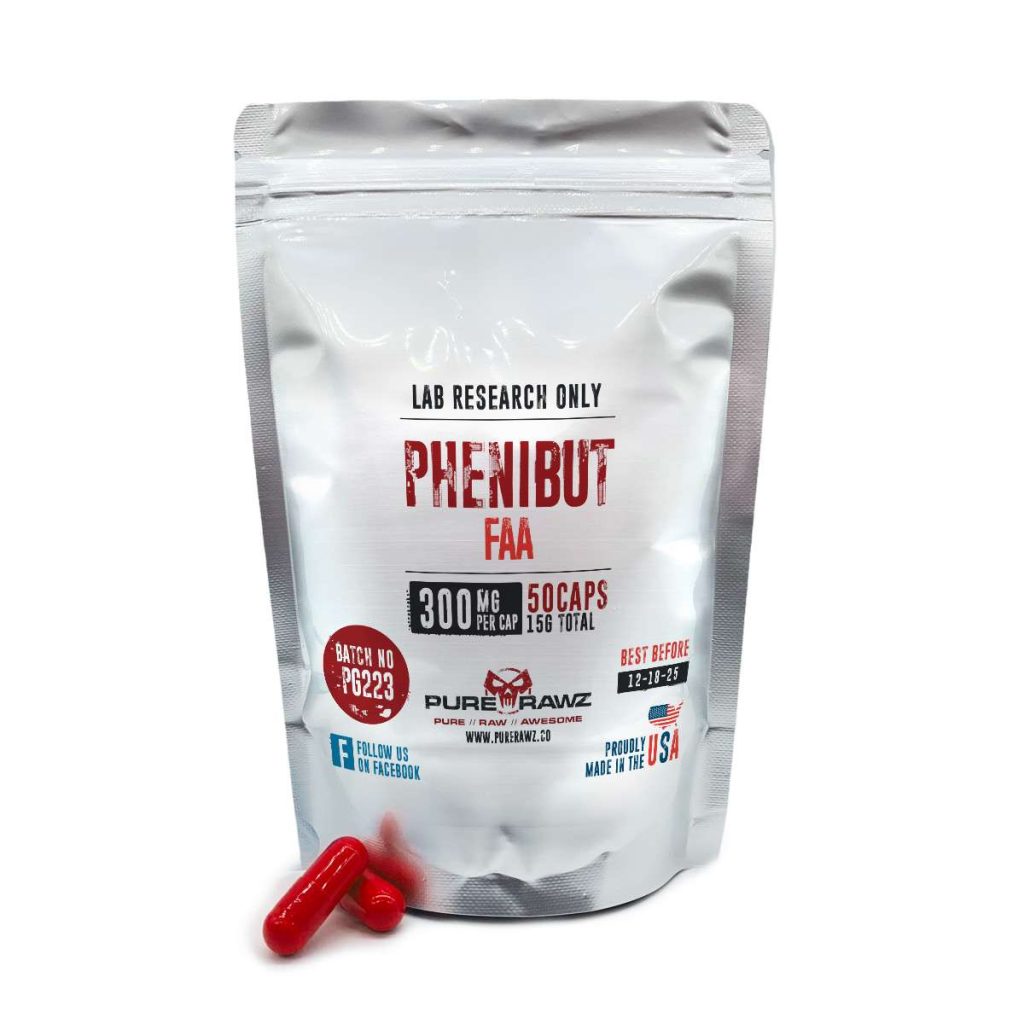
What to look for when choosing a nootropic supplier?
Quality and Safety
- Source and Testing: Look for suppliers that source ingredients from reputable vendors and perform tests on both raw materials and finished products. These tests should check for identity, purity, and any potential contaminants. Ideally, the supplier should provide certificates of analysis (COAs) as proof of testing.
- Transparent Labeling: The label should clearly list all ingredients and their exact quantities. Avoid suppliers that use proprietary blends where specific ingredient doses are hidden.
Third-Party Verification
- Independent Lab Testing: Top suppliers hire independent labs to test their products and make the results publicly available. This adds another layer of trust and assurance regarding the product’s quality.
Manufacturing Standards
- GMP Certification: Look for suppliers with GMP (Good Manufacturing Practices) certification. This signifies that they adhere to strict quality control procedures during production, ensuring consistent and reliable supplements.
Reputation and Reliability
- Experience and Customer Reviews: Choose established companies with a proven track record of quality and excellent customer service. Research online reviews and feedback on forums to gauge customer experiences.
Product Selection
- Variety: Having a wider selection allows you to find nootropics that address your specific needs and create stacks (combining multiple nootropics). However, remember, a vast selection doesn’t guarantee higher quality.
Price
- Competitive Pricing: While very cheap prices often indicate low quality, some suppliers offer competitive pricing on high-quality nootropics. It’s wise to compare prices from different vendors.
Customer Support:
- Knowledgeable Staff: Look for suppliers with a knowledgeable customer service team that can answer your questions and guide you in choosing the right products for your desired outcomes.
Where Can You Buy Phenibut Free Amino Acid?
Below is the best online store to buy Phenibut FAA.
| Vendor | Rating | Buying Link | Verdict |
|---|---|---|---|
| PureRawz | 4.9/5 | Buy Phenibut FAA from PureRawz | High-quality, well-reviewed product |
| Behemoth Labz | 4.8/5 | Buy Phenibut FAA Capsules from Behemoth Labz | Potent capsule form |
| RCD Bio | 4.7/5 | Buy Phenibut FAA Capsules from RCD Bio | Reliable vendor, affordable option |
To be the best supplier of research chemicals, They provide reference materials with every product we sell. Their products are all accompanied by an independent, third-party Certificate of Analysis for identification, purity, and concentration.
Frequently Asked Questions
Can you convert Phenibut HCl to Phenibut FAA?
Yes, it is possible to convert Phenibut HCl (hydrochloride) to Phenibut FAA (free amino acid) form. The two are different forms or salts of the same parent compound, Phenibut.
Phenibut HCl is more commonly available, while Phenibut FAA is considered by some to be more suitable for certain purposes due to its reduced acidity compared to the HCl salt.
To convert Phenibut HCl powder to the FAA form requires removing the hydrochloride component through a chemical process. This process likely involves treating the HCl salt with a base to remove the hydrochloride and isolate the free amino acid.
However, it’s important to note that converting between chemical forms requires proper knowledge of chemistry, necessary equipment, and careful handling. If you are not familiar with these procedures, it is advisable to seek guidance from an experienced chemist or professional rather than attempting the conversion yourself.
Is Phenibut FAA an approved dietary supplement?
While Phenibut has been granted approval for use in Russia and certain Eastern European nations, it currently lacks approval for inclusion in dietary supplements within the United States due to safety considerations raised by regulatory bodies.
Conclusion
Phenibut FAA powder has certainly caught the attention of many as a potential ally in the quest for relaxation and stress relief. Its unique mechanism of action, enhancing the GABA system with that added phenyl ring, seems like a clever workaround to the limitations of straight-up GABA supplementation.
The ease with which Phenibut FAA crosses the blood-brain barrier is a game-changer, allowing it to mingle with receptors and provide a sense of calmness. The reported benefits, from anxiety reduction to potential cognitive support, make it an intriguing player in the nootropic game.
However, it’s crucial to approach this with a balanced mindset. Like any powerful tool, Phenibut FAA demands respect. Understanding the recommended dosage and being mindful of potential interactions is paramount. While the rabbit study hints at cognitive perks, it’s a reminder that more research is needed to solidify these claims.
For those considering Phenibut FAA, consulting with healthcare professionals is non-negotiable. Our brains are unique, and what works for one may not work for another. Safety first.
In the grand scheme, Phenibut FAA powder stands as a fascinating option for those seeking a potential stress-buster. Just remember, moderation, caution, and expert advice should always be part of the equation when venturing into the world of nootropics.

